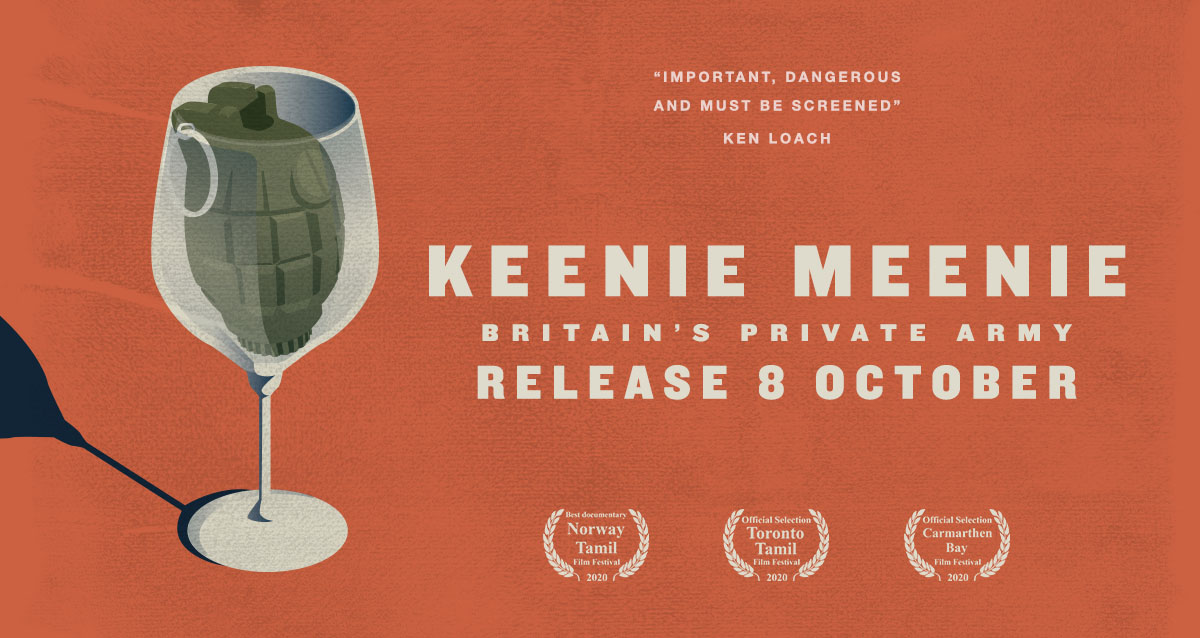Now our new film exposes the extent of these war crimes. Follow our investigation as we uncover secret diplomatic cables and meet insiders who reveal the British government’s covert support for Keenie Meenie – and the continuing cover-up.
Keenie Meenie provides long overdue evidence on the crimes of the people who make a killing from killing. Watch the full film for free here.
Directors’ note
We began making this film in 2017 when UK Foreign Office files about Keenie Meenie Services (KMS) started to be declassified. This came 30 years after they were first written by British diplomats in the midst of Sri Lanka’s long civil war.
These telegrams provided documentary evidence that British mercenaries had not only trained a notoriously violent Sri Lankan paramilitary unit – the Special Task Force – but that KMS pilots themselves flew helicopter gunships during operations. This happened during a period of constant aerial attacks on Tamil civilians in which hundreds of people were killed.
This paper trail from one of the most secretive foreign policy episodes of Margaret Thatcher’s tenure as prime minister also provided long-hidden clues about the key players at the centre of this story. It named the mercenaries, civil servants and political fixers who knew exactly what was happening.
While some had long since passed away, we were able to track others down in a four-year journey that took us around the UK, Europe and across post-war Sri Lanka — an island still living under a heavy military presence.
What these insiders told us in person was often more explicit than what had been recorded in the carefully worded diplomatic telegrams. As the film shows, many were proud of the work they had done with KMS. Sri Lankan paramilitary commanders stressed how KMS had played a crucial role in helping them win the war.
Richard Holworthy, Britain’s former defence attaché who liaised with KMS in Sri Lanka, smiled as he remembered the helicopter crews’ macabre methods of warfare.“They pulled the pin out and put the grenades into wine glasses – with the wine glass holding the lever [down] – and then they’d fly over and drop the wine glass with the grenade in it, and of course when it hit the ground the glass broke, the grenade exploded.”
He continued: “I know this was happening because when I went to Trincomalee [air force base] one day and had lunch there and there were no wine glasses at all – the whole bloody lot had been dropped on the Tamils with grenades inside them.”
‘Immoral’
Others are haunted by the human cost of these military operations against the country’s Tamil minority.
Survivors still struggle to come to terms with the horror they experienced – a feeling shared by some of those who worked for the company. KMS veteran Robin Horsfall told us: “I left because I wasn’t happy with the role that I was being asked to fulfil. There were a lot of undercurrents that were immoral. They were wrong.”
Between these feelings of horror and pride, we also encountered something else – a cover-up. Some of those who know the details of what happened in Sri Lanka during this period want it to stay secret. In the film, when we ask former KMS commander Brian Baty a question about Sri Lanka, he yells at us from his upstairs window: “Bugger off my land!”
Meanwhile, KMS co-founder David Walker appears in this film only in a series of stills. We could not find any video footage of him, and he did not respond to any of our requests for an interview. However, he currently owns and runs another private security firm, Saladin, based in west London.
Behind the mercenaries themselves – with their close connections to Britain’s special forces and intelligence agencies – there was always the political power of Whitehall. The UK government had a permissive policy towards KMS, which allowed the company to operate in Sri Lanka with a veneer of plausible deniability. To this day, the Foreign Office is resisting full disclosure of its KMS archive.
While Whitehall is hiding the past, another UK agency appears unwilling to learn from it. Our film shows how Police Scotland has been working with the exact same Sri Lankan paramilitary unit that KMS coached in the 1980s – a unit whose tactic back then “when fired upon while on patrol [was] to enter the nearest village and burn it to the ground”. Scottish police have since trained the unit in “public order” tactics and continue to offer Sri Lanka “community policing” skills.
However, there remains hope that the victims may see justice. The Metropolitan Police war crimes team recently launched an investigation into the activities of KMS in Sri Lanka. It is possible that some mercenaries may finally have to answer questions about their shadowy pasts, even if we were not able to speak to them for this film.
Bringing criminal charges against anyone who was involved in KMS from this period would be a landmark moment. Although the UK has one of the largest private security industries in the world, no one has been convicted of mercenary offences by a British court in the last 150 years.



